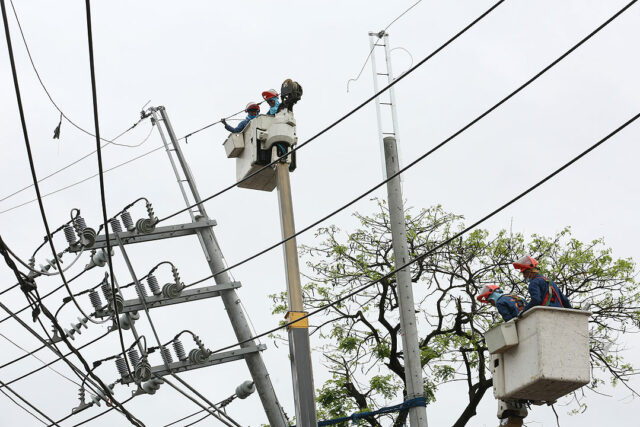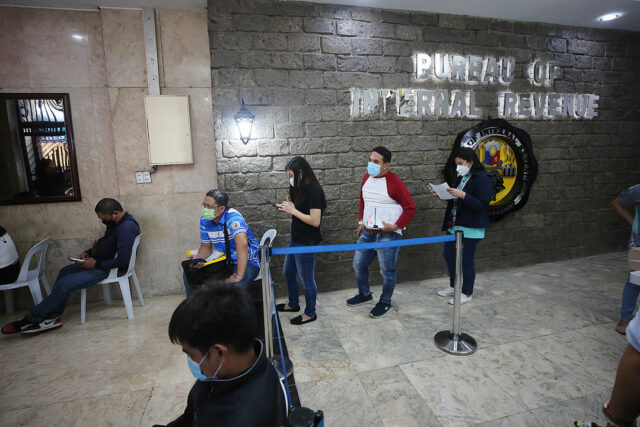Daily coronavirus infections likely to stay at 2,000
By Alyssa Nicole O. Tan, Reporter
DAILY coronavirus infections in the Philippines would probably stay at 2,000 for the rest of the year, according to a health expert, noting that the pandemic is far from over.
“The number of cases will hover around 2,000,” Jomar R. Rabajante, a researcher from the University of the Philippines COVID-19 Pandemic Response Team, told the ABS-CBN News Channel on Monday. “This implies the pandemic is far from over.”
The country’s healthcare use rates remained manageable, he added.
Mr. Rabajante urged authorities to continue monitoring the pandemic situation after it did away with the mask mandate outdoors.
“We can suppress the cases but our borders are open,” he said. “People can still import COVID-19 to the Philippines, possibly new variants.” People should continue wearing face masks especially in crowded areas, he added.
Mr. Rabajante warned of a potential coronavirus outbreak inside classrooms after millions of students returned to schools in August. Schools must enforce daily face-to-face classes starting next month.
The Philippines on Sunday posted 2,117 coronavirus cases, bringing the total to 3.95 million. Of the new cases, 908 were from the capital region, the Health department said.
Thirty-two more people died, bringing the death toll to 63,013. Almost 29,000 Filipinos were still infected with the virus, while 3.86 million have recovered.
Health officer-in-charge Maria Rosario Vergeire earlier traced the rise in infections to easing restrictions and more contagious subvariants.
About 73 million Filipinos have been fully vaccinated against the coronavirus. More than 19.3 million have been injected with their first booster shot, while more than 2.8 million have received their second booster.
Also on Monday, the Health department asked the Senate to increase the budget of attached agencies and corporations and agencies.
Its proposed budget of P301 billion is 10% higher than this year and accounts for 5.72% of next year’s P5.268-trillion budget. The secretary’s budget makes up 65% of the total and is 4% higher than this year.
“The budget level of most of our attached agencies and corporations has decreased in the 2023 National Expenditure Program,” Ms. Vergeire told the Senate finance committee at a hearing. Attached corporations account for 35% and attached offices make up 0.15% of its budget.
“We have submitted to Congress our request for additional funding for our government-owned and -controlled corporations to cater to more patients through its additional capital outlay requirements, information technology and other operational expenses,” she said.
The Department of Health (DoH) sought P500 million more for the Lung Center of the Philippines, P500 million more for the National Kidney and Transplant Institute, P200 million more for the Philippine Heart Center and P468 million more for the Philippine Children Medical Center.
It also proposed P70 billion more for Philippine Health Insurance Corp. (PhilHealth), P36 million more for the National Nutrition Council and P59 million more for the Philippine Institute for Traditional and Alternative Healthcare.
Senator Emmanuel Joel J. Villanueva said the DoH budget is P27 billion higher than this year, but “the increase was mainly for the subsidy of PhilHealth at P20 billion.”
Senator Joseph Victor “JV” G. Ejercito also brought up Universal Healthcare Law, which mandates a 0.5% increase in yearly premiums starting at 3% in 2020 until it hits 5%.
He asked if it was possible to keep the current premium rate. “How much is needed to reach a status quo of 3% or 3.5% so that it won’t be too heavy for employees, direct contributors and overseas Filipino workers (OFW)?”
PhilHealth officer-in-charge Eli Dino D. Santos said they had no choice but to enforce the law, noting that they started collecting a 4% premium starting this year.
“We agree with Senator JV Ejercito on the situation of the OFWs, but to my mind, we need to balance the ability of PhilHealth to finance the benefits that it is mandated to provide under the Universal Healthcare Act,” he said.
Mr. Ejercito also asked why no budget was allotted for cancer patients.
Ms. Vergeire said they have appealed to the Budget department to restore the P500-million budget for the program, which along with mental health is the only noncommunicable disease line item.
“Our budget for the cancer program increased from P786 million in 2022 to P1 billion in 2023, so it’s good that they’re together but if it’s going to be separated, it’s going to be sustained through the years which is better for our program,” she added.
Mr. Villanueva said that the government should continue boosting its support for cancer patients.












